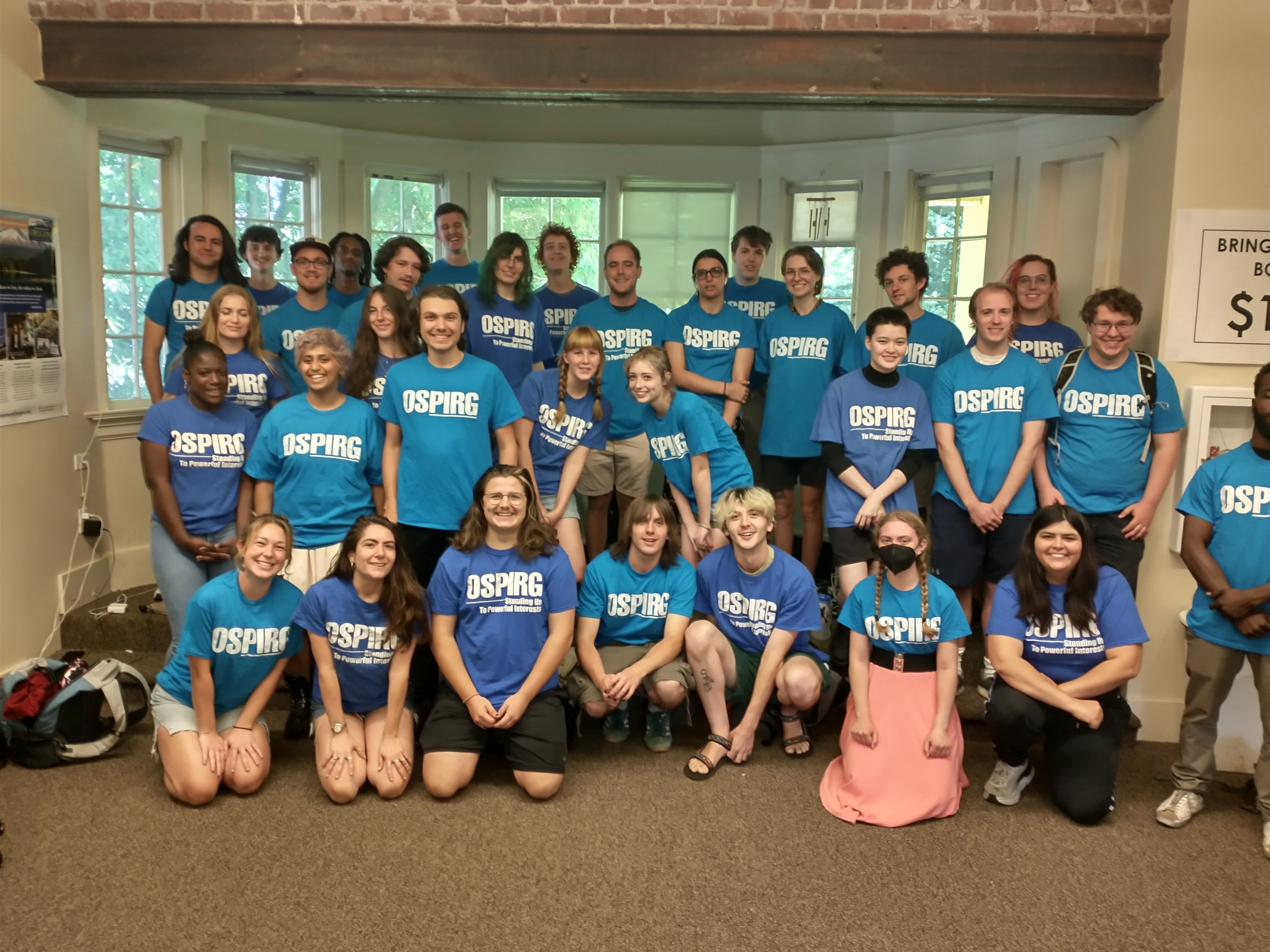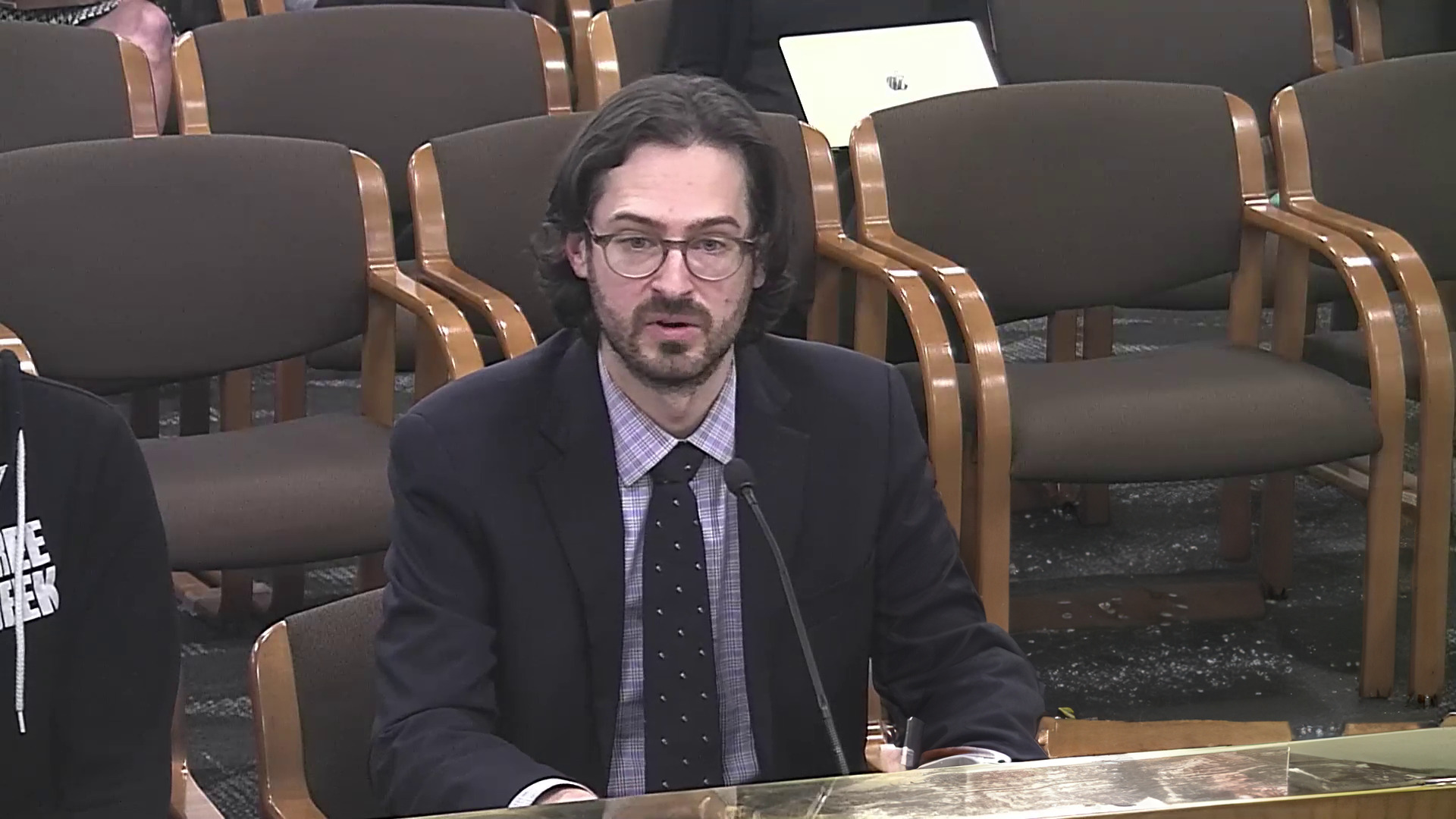
OSPIRG’s 2023 Legislative Session Recap
The Oregon legislature adjourned in June after months of debate and deliberation over hundreds of bills that will impact Oregonians. Here's the good, the bad, and the unfinished.

The Oregon legislature adjourned in June after months of debate and deliberation over hundreds of bills that will impact Oregonians. OSPIRG’s mission is to be a voice for the public in places where decisions are being made and to deliver persistent, results-oriented public interest activism that protects consumers; encourages a fair, sustainable economy; protects public health and fosters responsive, democratic government.
To that end, I’m happy to report that we successfully passed several priority bills to reduce plastic pollution, bring down the cost of health care, and protect consumers. However, the session was not without disappointment; most notably our priority Right to Repair bill which would reduce e-waste and save households money failed to move forward. Additionally, several of the bills we supported became less ambitious during the legislative process and one we opposed passed.
As is always the case, we’re proud of what we were able to do this session but are always looking to continue to move the ball forward for the public interest.
With that in mind, here’s a wrap-up of what OSPIRG accomplished with your support in the 2023 legislative session.

Good bills that passed
Beyond Plastics
Every day, people throw away tons of plastic “stuff” — cups, plates, bags, containers, forks, knives, straws, spoons and more. All of this waste not only clogs our landfills, trashes our parks, and litters our streets, but it also washes into our rivers and oceans, where it can harm wildlife.
OSPIRG-supported bills that passed this session:
SB 543: Bans statewide polystyrene takeout containers and cups to reduce one of the most egregious single-use plastics, more commonly known as Styrofoam.
SB 545: Legalizes reusables by updating Oregon health code to establish legal reuse systems and consumer opportunities to bring their own containers to cut down on wasteful packaging.
Protecting Consumers
Oregonians deserve fair rules of the road and an even playing field in the marketplace. We work to educate consumers how to protect themselves and their rights, end exploitative practices in the financial marketplace, and advocate for new rules, institutions and policies to defend consumers from the economic and political power of special interests.
OSPIRG-supported bills that passed this session:
SB 619: Creates data privacy protections for Oregonians, including the right to opt-out of the sale of their data to third-parties, the right to have their information corrected or deleted, and a right to know with whom their data has been shared.
While we supported the bill, we were disappointed to see that the original enforcement mechanism, which would have allowed consumers to directly bring suit against companies for breaking the law, was removed from the final version.
HB 2052: Requires data brokers who collect, share, and sell personal information about Oregonians to register with the state.
High Value Health Care
The cost of health care continues to rise in Oregon, consuming more of the resources of consumers, businesses, and the public every year. OSPIRG is pushing for policies that will maintain a competitive marketplace, increase consumer choice, and provide better value for consumers.
OSPIRG-supported bills that passed this session:
SB 192: Increased transparency for pharmacy benefit managers (PBMs), the middlemen in the pharmaceutical supply chain who often receive rebates and other fees in return for putting drugs on formulary lists, determining which drugs insurance plans will cover. These negotiations, rather than decreasing costs, inflate prices for the drugs and increase consumer cost-sharing. The bill also required the Prescription Drug Affordability Board (PDAB) to make recommendations to the legislature on criteria for setting cost caps for certain high-cost prescription drugs due in 2025.
Originally, this bill would have empowered the PDAB to actually set cost caps on the drugs it reviews and finds unaffordable. This would have been a stronger, more immediate step to lower the cost of prescriptions in Oregon, though we still support the bill as passed.
SB 972: Directs the Oregon Health Authority to begin transitioning Oregon to a state-based marketplace for health insurance enrollment by 2026. The current health insurance marketplace is not a very user-friendly website and has many limitations when it comes to tailoring health plans and enrollment processes to Oregonians’ needs. A state-based marketplace changes that, opening up opportunities for further cost containment, offering small business plans on the exchange, and improving state data collection on health plan selection and needs.
HB 3320: Requires hospitals to screen every patient for financial assistance before receiving a bill for more than $500. This presumptive eligibility will ensure that the bills patients get are closer to the amount they would actually owe, reducing the need for patients who qualify for financial assistance to go through an arduous application process.
Stopping Toxic Threats
There are more than 80,000 chemicals on the market in the United States, most of which are put directly into use without testing the long-term consequences for our health or their impact on our environment. We should make sure that any chemical in use is safe, eliminate those we know are dangerous, and stop using any that are damaging healthy ecosystems.
OSPIRG-supported bills that passed this session:
HB 3043: Strengthens and modernizes the 2015 Toxic Free Kids Act (TFKA). HB 3043 brings the original act up to date with more recent scientific developments and empowers the Oregon Health Authority to take appropriate action to protect Oregon’s children from toxic products.
SB 546: Requires public disclosure about the worst carcinogens found in cosmetics and personal care products and bans their sale in Oregon.
Higher Education
Higher education in America continues to be critical for both individual success and the social and economic health of our country. While college attendance has grown over the past two decades, state appropriations and federal aid have failed to keep pace with the rising cost of college, shifting more costs to students and their families.
OSPIRG-supported bills that passed this session:
SB 424: Prevents higher education institutions from withholding transcripts from students who owe a debt to the institution.
Unfinished business
Every session, many good ideas with public support unfortunately don’t end up making it across the finish line. We’re committed to continue advocating for these policies until we see them passed through the legislature and signed by the governor.
Right to Repair (SB 542): Would have helped reduce electronic waste and saved consumers money by making it easier for people to fix their stuff. Right to Repair requires electronics and appliance manufacturers to provide parts, tools, and repair information needed to fix their products so people don’t have to buy new and throw away the old.
Preventing new or expanded “chemical recycling” facilities in Oregon (HB 3597): So-called “chemical recycling” is a false solution to our plastics problem, which exacerbates the climate crisis and distracts from real solutions like reducing plastic production and transitioning to a zero waste system.
Toxic-free Schools (SB 426): Would have increased transparency around pesticide use at Oregon schools so we can minimize the spraying of the worst pesticides on school grounds, especially close to where kids play.
Auto-insurance consumer protections (HB 2920): Would have prevented auto insurance companies from using credit scores to determine rates, a practice that leads to higher insurance rates for low-income Oregonians and those with mistakes on their credit score.
Banning yo-yo financing (HB 2801): Sometimes, dealerships will notify consumers that their loan has not been approved many days after they have taken the car home. Then, they need to return the car or agree to a higher interest rate as well as potentially having to pay fees for the use and wear of the car. This bill would have banned this practice.
Debt collection reform (HB 2008): Medical debt is one of the biggest forms of debt in Oregon and is often mistreated – attributed to the wrong person, for the wrong amount, etc. This bill would have fixed a loophole in the law that limits consumers from challenging a debt with this misattribution, as well as extended the current one-year statute of limitations for wrongful collection of debt to the same six-year timeframe collectors have to pursue a debt.
Flavored tobacco & vaping ban (HB 3090): Would have prohibited the sale in Oregon of flavored tobacco & vape products. The U.S. Surgeon General has declared e-cigarette use, commonly known as vaping, among young people an epidemic due to its popularity and health risks. One in 5 high schoolers reported vaping in 2018, a nearly 80 percent increase in one year. An entire generation is at risk of nicotine addiction, and millions of kids are already hooked on nicotine with serious implications for their health and future.
Public option health plan (HB 3422): Would have directed the state to create a plan for a low-cost, high-quality health plan for Oregonians who aren’t eligible for current state health programs and don’t get health insurance from their employer.
Global health care budget (HB 2878): Would have created a program to lower the cost of health care by reforming how hospitals charge for their services. A ‘global budget’ pilot program would have tested these alternate payment methods in health care to reduce reliance on a system that currently charges consumers for quantity rather than quality of care. Health care costs are often inflated by complicated payment systems, and this program would have been the perfect opportunity to find alternatives that lower health care costs.
Bad bills that passed
While we are usually in a position of advocating for good policy to pass, sometimes we have to oppose bills that will roll back or weaken good public interest policy. This session one bill we opposed passed:
Weakening health care spending targets (HB 2045): Exempts hospitals’ frontline labor costs from the cost growth target, a program intended to capture the total cost of health care spending in the state and limit its growth. The state already had a standard in place for exempting certain justified costs, but this bill eliminates the need for hospitals to provide any explanation or justification for a major part of health care spending, weakening the cost growth target and setting a precedent for further unjustified exemptions in the future.
Topics
Find Out More


Apple AirPods are designed to die: Here’s what you should know

Consumer Protection Week 2024: Empowering Consumers in a Complex Marketplace
